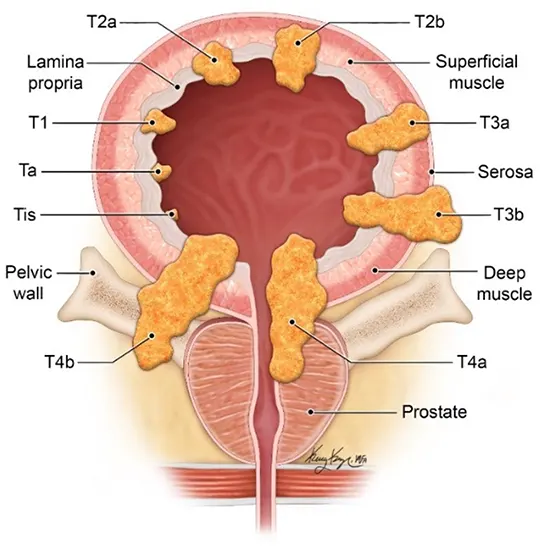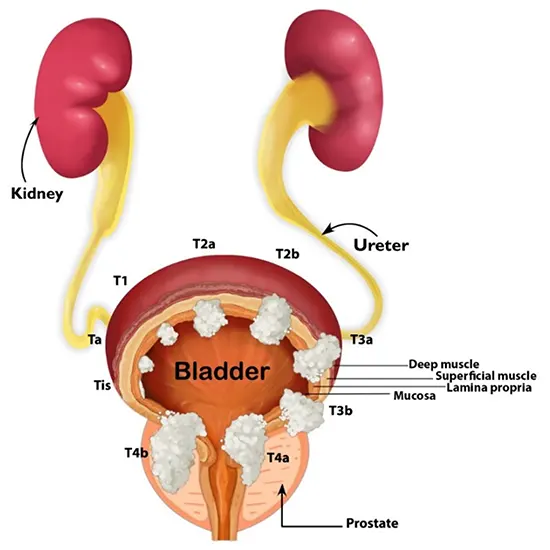
Urinary bladder cancer is a type of cancer that develops in the cells of the bladder. The bladder is a hollow organ in the pelvis that stores urine until it is ready to be expelled from the body. Bladder cancer can occur in...
Urinary bladder cancer is a type of cancer that develops in the cells of the bladder. The bladder is a hollow organ in the pelvis that stores urine until it is ready to be expelled from the body. Bladder cancer can occur in any part of the bladder, but most often develops in the cells lining the inside of the bladder.
Some of the common symptoms of bladder cancer include blood in the urine, frequent urination, pain or burning during urination, and pelvic pain. These symptoms can also be caused by other medical conditions, so it is important to consult with a healthcare provider for a proper diagnosis.
Risk factors for bladder cancer include smoking, exposure to certain chemicals, chronic bladder infections, and a family history of bladder cancer. Treatment options for bladder cancer depend on the stage and extent of the cancer, but may include surgery, radiation therapy, chemotherapy, or a combination of these approaches.
Early detection and prompt treatment are important for improving the chances of a successful outcome in bladder cancer. Regular check-ups with a healthcare provider and following recommended screening guidelines can help detect bladder cancer in its early stages.
Types of urinary bladder cancer
There are several types of urinary bladder cancer, but the two main types are urothelial carcinoma (also known as transitional cell carcinoma) and squamous cell carcinoma. These two types account for the majority of bladder cancer cases.
Urothelial Carcinoma: This is the most common type of bladder cancer, accounting for about 90% of cases. It starts in the urothelial cells that line the inside of the bladder. Urothelial carcinoma can be either non-invasive or invasive, depending on whether it has spread beyond the bladder lining.
Squamous Cell Carcinoma: This type of bladder cancer is less common, accounting for about 4% of cases. It develops in the squamous cells that make up the lining of the bladder when chronic irritation or inflammation of the bladder is present.
Adenocarcinoma: This type of bladder cancer is rare, accounting for about 1% of cases. It develops in the glandular cells that produce mucus in the bladder lining.
Small Cell Carcinoma: This type of bladder cancer is very rare, accounting for less than 1% of cases. It develops in the nerve-like cells called neuroendocrine cells in the bladder lining.

There are also other rare types of bladder cancer, such as sarcoma and lymphoma, but they are much less common than the types mentioned above.
Stages of urinary bladder cancer
The stages of urinary bladder cancer are used to describe the extent and spread of the cancer within the bladder and to other parts of the body. The stages are determined by the size of the tumor, how deeply it has invaded the bladder wall, and whether it has spread to nearby or distant organs. The most commonly used staging system for bladder cancer is the TNM staging system, which stands for Tumor, Node, and Metastasis.
The stages of urinary bladder cancer are as follows
Stage 0 (CIS): This is the earliest stage of bladder cancer, also known as carcinoma in situ (CIS). The cancer cells are found only in the innermost layer of the bladder lining and have not invaded the deeper layers or spread to other organs.
Stage 1: At this stage, the cancer has grown into the connective tissue layer of the bladder wall, but has not spread beyond it.
Stage 2: At this stage, the cancer has grown into the muscle layer of the bladder wall, but has not spread to nearby lymph nodes or other organs.
Stage 3: At this stage, the cancer has grown through the muscle layer of the bladder wall and has spread to nearby tissues and lymph nodes.
Stage 4: This is the most advanced stage of bladder cancer. The cancer has spread to nearby organs or tissues beyond the bladder, such as the prostate gland, uterus, rectum or pelvic wall, or to distant organs, such as the lungs or liver.
Determining the stage of bladder cancer is important for determining the best treatment options and predicting the likely outcome of the cancer.
Symptoms of Urinary Bladder Cancer
The symptoms of urinary bladder cancer can vary depending on the stage and location of the cancer. However, the most common symptom of urinary bladder cancer is blood in the urine, which ranges from a slight pinkish tinge to bright red.
Other symptoms may include
- Frequent urination
- Pain or burning during urination
- Urgency to urinate
- Pain in the lower abdomen or back
- Inability to urinate
- Weight loss
- Fatigue
- Swelling in the legs
These symptoms can also be caused by other medical conditions, so it is important to consult with a healthcare provider for a proper diagnosis.

If you experience blood in your urine, it is important to seek medical attention immediately as it can be a sign of other serious medical conditions, including bladder cancer. Early detection and prompt treatment are important for improving the chances of a successful outcome in bladder cancer.
Causes of Urinary Bladder Cancer
The factors that may increase the risk of developing the urinary bladder include:
Smoking: Smoking is the leading cause of cancer of the urinary bladder, and accounts for about 50% of all cases.
Exposure to certain chemicals: Long-term exposure to chemicals like benzene, aromatic amines, and aniline dyes, which are used in the production of plastics, rubber, and textiles increases the risk of urinary bladder cancer development.
Chronic bladder infections: The chronic level and repetitive infection of the urinary bladder increases the risk of cancer of the urinary bladder.
Family history: A family history of urinary bladder cancer may increase the risk of developing the cancerous disease.
Age and gender: Urinary bladder cancer is more common in men than women, and the risk of the development of cancer increases with age.
Radiation therapy: Previously taken radiation therapy may increase the chance of the development of urinary bladder cancer.
Certain medications: Some medications, such as pioglitazone and cyclophosphamide have been associated with an increased risk of bladder cancer.
Prevention of Urinary Bladder Cancer
There are several steps you can take to reduce the risk of developing urinary bladder cancer including:
Quit Smoking: Smoking is the most common cause that increases the risk of urinary bladder cancer. By quitting the smoke, you can prevent or reduce the risk of developing cancer.
Limit exposure to harmful chemicals: By following the safety instruction, try to limit exposure to harmful chemicals. Because some chemicals such as benzene, aromatic amines, aniline dyes, etc. are known to develop bladder cancer and reduce the risk of development of the disease.
Improve your diet: Take a diet that is rich in fruits and vegetables. Fruits and vegetables contain antioxidants which are helpful in reducing the risks of developing urinary bladder cancer.
Keep yourself hydrated: Drinking plenty of fluids, especially water helps in diluting the concentration of harmful substances in the urine and reduces the risk of having urinary bladder cancer.
Diagnosis of Urinary Bladder Cancer
If a person experiences the symptoms that suggest cancer of the urinary bladder or if they have risk factors for the disease, a healthcare provider may recommend several tests to diagnose the cancer of the urinary bladder such as:
Urine Cytology : For the urinary tumor marker test, a sample of urine is examined under the microscope to look for the cancer cells.
Cystoscopy : A thin and flexible tube with a camera at the end is inserted into the bladder through the urethra to look for abnormal areas or tumors.
Biopsy : A sample of tissue from the bladder is removed and examined under the microscope to confirm the presence of a tumor.
Once the bladder cancer is diagnosed then additional imaging tests such as CT, MRI, PET CT, Bone scan and chest x-ray, etc. are performed to determine the stage and spread of cancer whether it has spread to other body parts.
Imaging tests : Imaging tests such as CT Urography, MRI urography, Abdominal ultrasound, whole body pet scan, Bone scan, chest x-ray, etc are performed to examine the urinary bladder, check whether the urinary tract is working well and check the signs of cancer disease. Apart from this, surrounding tissues and organs are also examined to check whether they are working effectively or got affected by cancer.
With the help of imaging tests, doctors be able to detect the stages of cancer and determine whether the cancer is low-grade bladder cancer or high-grade bladder cancer.
It is very important to note that the urinary bladder cancer diagnosis is very complex but to get the effective and best course of treatment for your cancer disease, you need proper diagnosis.
Conclusion
Urinary bladder cancer is a type of cancer that affects the tissues of the urinary bladder which are hollow organs in the lower part of the abdomen that stores urine. The majority of urinary bladder cancer starts in the cell lining the inside of the bladder known as urothelial cells. The common symptoms of urinary bladder cancer include blood in the urine, frequent urination, painful urination, etc.
The risk factors for developing bladder cancer are family history, smoking, inflammation in the bladder as well as exposure to chemicals, etc. The treatment of urinary bladder cancer can be surgery, radioactive iodine therapy, chemotherapy, targeted therapy or immunotherapy, etc. depending on the severity of the problem. Detection of cancer at an early stage can help the doctor in deciding the specific therapy as per the condition of the patient.
Ganesh Diagnostic is offering the urinary bladder cancer screening package for detecting urinary bladder cancer at an early and easily treatable stage. For any query regarding the diagnostic tests for urinary bladder cancer, contact us.









